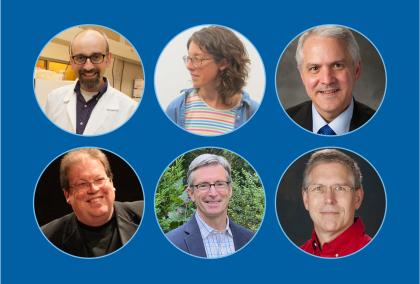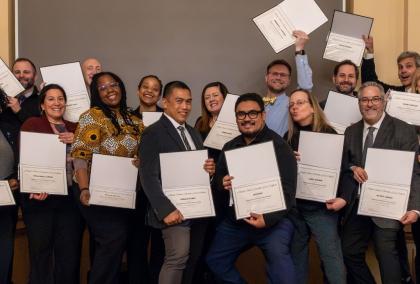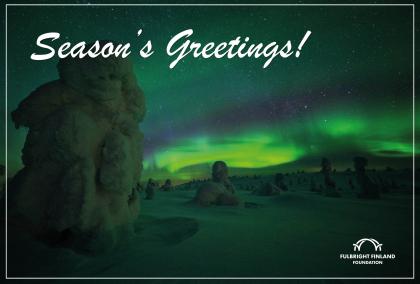From Great Anticipation to Considerable Disruption
By William Helling
Published on July 15, 2020
All seemed to change for me on March 12, 2020…but let me start at the beginning.
I arrived in Finland on January 7, 2020 with great anticipation. I was a Fulbright Scholar from Indiana University Purdue University at Indianapolis (IUPUI), a member of the School of Informatics, which housed my Department of Library and Information Science. I was visiting Haaga-Helia University of Applied Sciences for the spring semester, scheduled to stay until June 15. I was to teach several courses at Haaga-Helia while also preparing a study abroad program for the School of Informatics. I had actually spent the fall 2013 semester as a Fulbright Scholar at Haaga-Helia, and this return visit would help me bring to fruition a cooperation between our two universities. My wife joined me in mid-February and would spend the remainder of the grant period with me. All seemed set for an enjoyable and productive semester where I planned to accomplish many goals for both my host and home institutions.
It is difficult to remember at this time exactly what I knew about a potential virus outbreak or even a full-scale pandemic. News stories were slowly appearing, but a few Fulbrighters even considered the possibility of what would eventually happen. It seems now as if we were in a pot of water that was eventually, slowly, brought to a boil.
My teaching duties kept me extremely busy. I was co-teaching on-site sections of software engineering and web design, as well as an online section of ICT & Business English. In addition, I was teaching a course I was asked to take just before the semester started, an 8-week on-site course on research that prepared Haaga-Helia students for writing their obligatory theses. I had to prepare lectures and supplementary materials for this intensive course of approximately 40 students entirely on my own, with little advanced warning. But I was in the classroom, which is always enjoyable, and I was able to integrate myself with the teaching faculty and the students. Because of this heavy initial load, I set appointments and interviews for my study abroad initiative for late March, and anticipated working on it the last half of the semester. The program director for the Department of Library and Information Science was also scheduled to arrive in Helsinki March 15 and help me with the study abroad program. That same week I was to visit the National Repository Library in Kuopio as well as begin interviews at Helsinki Public libraries, starting with Kallio. A few days after that, I expected a visit from the director of public services for the Indianapolis Public Library system (28 branches).
As March got underway, however, the situation worsened around much of the world and began to affect Finland. Back in the United States, IUPUI declared that its spring break (which was to start March 16) would be extended a week, but then the extension eventually grew into a 100% migration to online courses for the entire semester. At the same time, I was still involved in my on-site classes at Haaga-Helia, going to campus at least three days a week to teach, and I continued making plans for the rest of the semester. On March 12, I was on campus all morning to proctor an examination in a room packed with more than 30 students. Of course, everyone was feeling a bit uneasy by this time in any public gathering, and students started to complain about being in close contact with other students who were showing signs of fever, coughing, etc. That afternoon, the faculty and staff of Haaga-Helia still congregated in our open office space, working as if the same model would continue until the end of the semester. I did not know at that time that March 12 would be the last day I would spend in person with any students or colleagues at Haaga-Helia.
Haaga-Helia soon declared its own extension of an upcoming spring break and then rolled that into a semester-long closing of the campus, forcing all on-site classes to also go online. Because Haaga-Helia was technically equipped for online services, I would continue teaching even if I were increasingly isolated in my apartment as Helsinki life became more restricted and the government took firm measures to mitigate the effects of the pandemic. I could still teach online, but with absolutely no hope of seeing a student or colleague again in person before the end of the semester. As an experienced online teacher (my program at IUPUI has been all online since 2014), I fortunately knew how to make a virtual classroom work wherever I was, even though it was not what I anticipated or wanted.
As for my study abroad project, much depended on visits and establishing personal relationships, examining venues and possibilities for the potential IUPUI student participants. However, this activity was now eliminated. Organizations such as libraries and archives closed their doors; my contacts retreated to their homes to self-isolate. There was no formula for networking online when everyone's priority was to remain safe and to learn how to work remotely with little or no preparation. For my program contacts, and even for me, my study abroad initiative was no longer a priority, especially when no one then, or even now, could project any timeline for the return to a pre-pandemic mode of behavior.
My decision to return home with my wife was certainly influenced by the evolution of my Fulbright activities. I did not abandon my Haaga-Helia teaching even though my Fulbright status was terminated early. I could no longer set foot into the Haaga-Helia university where I had interacted so heavily with students and fellow instructors, but I could teach from any location. And no one wanted to work at this point on a study abroad program when the thought of any unnecessary international travel was abandoned for the near future. Finally, I had many plans to visit the areas in Finland that I neglected during my first sojourn, and the list was long. Of course, these plans were set to take place after my intensive 8-week course on research (by mid-March) when I would finally have some more time to invest in personal projects. But at this point, any unnecessary regional travel was strongly discouraged.
I would have loved to stay in Helsinki to finish teaching even if only online, but I could not claim that it was obligatory for me to do so. No one would want to talk about student exchanges and study abroad matters until there was a better understanding of the pandemic crisis, and months after its disruption we are nowhere closer to doing so. My personal travel ambitions, although a strong part of the Fulbright experience and highly encouraged, would be impossible -- and even the Helsinki region was moving toward rigid travel restrictions by then. Yet, these were not the only factors in my decision to return home. In spite of the wonderful support of the Fulbright Finland team, which would have done anything in its power to assist us -- and supported us in any decision we made -- my own government made it clear that a Level 4 category (which was declared in March) would signal a need to return to the US at the earliest opportunity. Warnings were raised that future travel could not be guaranteed. And this last variable made the painful decision to return home a necessity: I have two elderly parents who I already had to urge via Zoom several times to stay home and to self-isolate. I also have three children and three grandchildren who I feared would need us -- or unnecessarily worry about us. I actually felt safer in Finland than in the US, but I could not risk being unable to help my family if suddenly needed. I would have felt very selfish self-isolating in a safer place, perhaps even being a burden on the Finnish government or my hosts.
Once the decision was made to leave, we just had to find a way to do it. Everyone abroad at that moment already is familiar with the total confusion of planning airline travel. The original airline reservation I had flying to Amsterdam and then to New York was impossible to move up. My wife and I finally obtained alternate passage to the United States via Iceland to Chicago for March 25th, but it was canceled on the 22nd. I scrambled and found a flight for us to London and then on to Miami on the 23rd. Packing was hectic and proper goodbyes were impossible, especially under the circumstances. Travel was still eerie at that time, at the height of tension when the initial crowds of overseas travelers were trying to return to the United States, and no one seemed prepared for the confusion. We were fortunate to travel just after this shocking time, and our voyage was a long blur of strangely empty airports where the travelers were outnumbered by the airport and security staff. We left for the airport in Helsinki early one 20-degree Fahrenheit morning and arrived in Miami some 16 hours later, in a quiet 80-degree evening. Our connecting flight to Indianapolis was on time and uneventful, but I was not surprised to be the only traveler renting a car late that night for the final leg home.
"Yet, I had to leave a special place, a place I had worked very hard to get to. Finland and its people will always be dear to me."
Upon re-entry I could not help but to feel depressed and a bit cheated, although I knew I already had an opportunity that few others have experienced. Yet, I had to leave a special place, a place I had worked very hard to get to. Finland and its people will always be dear to me. I have taken pains to study its culture, its history, and even its wonderful but difficult language. Finland remains a passion for me. I also had to leave some friends and a few special Fulbrighters became sort of like a family to me. I always will regret not having had more time to spend with them. I still think of them fondly. But I cannot feel sorry for myself when so many others are suffering during this crisis.
In any case, I was still actively engaged in teaching my Haaga-Helia classes through May 2020, and the morning after my arrival back in the United States, I was at my computer grading assignments and answering questions as if nothing had changed. I told myself that I did not have to completely abandon my study abroad proposal, but just simply had to delay this project. The opportunity is still there, and the Fulbright award is not expected to end when one's grant period closes. The Fulbright initiative continues after we return home, and I am heartened by the continued support of the Fulbright Finland team. As I was composing my narrative, I received yet another encouraging email from the team, a message that reinforces my desire to complete what I had originally intended:
"The COVID-19 pandemic has dramatically highlighted the importance of science, research, teaching, and international collaboration in the efforts to solve the most urgent issues facing our global community." - Terhi & the Foundation team (May 18, 2020)
I told myself that I would somehow come out better for this unusual experience after I first learned how to survive a disruption of unprecedented scope. Having had the opportunity to work with the Fulbright Finland Foundation yet again has been the silver lining in this entire affair. I have profited in so many ways, even with my abbreviated stay. I realize now more than ever that the Fulbright Finland Foundation will do anything it can to help us succeed and will support us with any means at its disposal. If there are any life lessons in this episode, they would center on the need to take advantage of every day during your Fulbright grant period and the importance of making it a life-long initiative. That is something I plan to do, and I am determined to return in some capacity or another to work on the inter-campus collaboration between my host and my university…and also to renew my relationship with Finland.
Nähdään taas!


